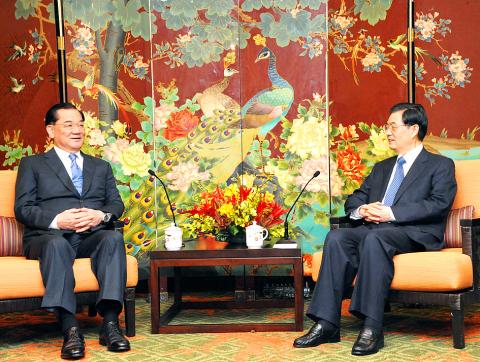President Ma Ying-jeou’s (馬英九) APEC envoy, Lien Chan (連戰), yesterday discussed the idea of signing a cross-strait peace agreement during a meeting with Chinese President Hu Jintao (胡錦濤), drawing criticism from the Democratic Progressive Party (DPP), which said this constituted a violation of Ma’s “10 guarantees.”
During his 55-minute meeting with Hu in Honolulu, Hawaii, prior to the main APEC leaders’ summit scheduled for yesterday and today, Lien put forward the issue of signing a cross-strait peace agreement, saying he hoped both sides “could start to exchange views on the peace issue.”
Lien expressed the hope that both sides could review the issue in due time, but that this should be a more long-term goal.

Photo: AFP
In Taipei, the Democratic Progressive Party (DPP) criticized Lien, saying his remarks suggested that “Ma’s ‘10 guarantees’ are a lie.”
The DPP was referring to the “10 guarantees” Ma gave late last month that include “one framework, two prerequisites, three principles and four assurances” that he said would need to be in place before Taiwan would consider working toward a peace accord with China.
DPP spokesperson Chen Chi-mai (陳其邁) said Lien should have focused his talks with Hu on issues relating to international trade.
“That Lien broached the [peace agreement] issue with Hu shows that the Chinese Nationalist Party [KMT] has already started to negotiate with the Chinese Communist Party [CCP] on the peace accord behind closed doors,” Chen said.
Noting that Ma had initially included negotiating a peace accord in his “golden decade” policy, but then later said a peace accord would not need to be limited to a decade, Chen added: “After Lien’s meeting with Hu yesterday, it seems that the negotiations aren’t going to take a decade as Ma said they would: They have already started. Ma has already started negotiations on a peace accord.”
Saying that since the annual KMT-CCP summit began in 2005 and a Lien-Hu communique was signed, which included a point on resuming cross-strait negotiations to achieve peace, Chen said: “Ma’s unilateral decision to use the results of the 2005 KMT-CCP closed-door negotiations as the guiding principle to negotiate a peace accord with China is using the will of one person and one party to decide the fate of the country.”
“The move is pushing Taiwanese toward fear and an uncertain future,” he said, adding: “Ma should tell us what he’s worried about and explain why his cross-strait policies are so contradictory and rash.”
During the Lien-Hu meeting yesterday, the two also touched on the so-called “1992 consensus.” Hu said both sides should stick to the consensus and safeguard the peaceful development of cross-strait ties, while Lien said the consensus is the basis for the peaceful development of cross-strait relations and the cornerstone of cross-strait trade benefits and prosperity.
Lien also urged China to speed up negotiations on a cross-strait investment protection agreement and follow-up issues relating to the cross-strait Economic Cooperation Framework Agreement.
According to Lien, Hu acknowledged the complex nature of the issues and said that they would be resolved one by one.
Additional reporting by Rich Chang
Translated by Jake Chung, Staff writer

The US government has signed defense cooperation agreements with Japan and the Philippines to boost the deterrence capabilities of countries in the first island chain, a report by the National Security Bureau (NSB) showed. The main countries on the first island chain include the two nations and Taiwan. The bureau is to present the report at a meeting of the legislature’s Foreign Affairs and National Defense Committee tomorrow. The US military has deployed Typhon missile systems to Japan’s Yamaguchi Prefecture and Zambales province in the Philippines during their joint military exercises. It has also installed NMESIS anti-ship systems in Japan’s Okinawa

‘WIN-WIN’: The Philippines, and central and eastern European countries are important potential drone cooperation partners, Minister of Foreign Affairs Lin Chia-lung said Minister of Foreign Affairs Lin Chia-lung (林佳龍) in an interview published yesterday confirmed that there are joint ventures between Taiwan and Poland in the drone industry. Lin made the remark in an exclusive interview with the Chinese-language Liberty Times (the Taipei Times’ sister paper). The government-backed Taiwan Excellence Drone International Business Opportunities Alliance and the Polish Chamber of Unmanned Systems on Wednesday last week signed a memorandum of understanding in Poland to develop a “non-China” supply chain for drones and work together on key technologies. Asked if Taiwan prioritized Poland among central and eastern European countries in drone collaboration, Lin

BACK TO WORK? Prosecutors said they are considering filing an appeal, while the Hsinchu City Government said it has applied for Ann Kao’s reinstatement as mayor The High Court yesterday found suspended Hsinchu mayor Ann Kao (高虹安) not guilty of embezzling assistant fees, reducing her sentence to six months in prison commutable to a fine from seven years and four months. The verdict acquitted Kao of the corruption charge, but found her guilty of causing a public official to commit document forgery. The High Prosecutors’ Office said it is reviewing the ruling and considering whether to file an appeal. The Taipei District Court in July last year sentenced Kao to seven years and four months in prison, along with a four-year deprivation of civil rights, for contravening the Anti-Corruption

NO CONFIDENCE MOTION? The premier said that being toppled by the legislature for defending the Constitution would be a democratic badge of honor for him Premier Cho Jung-tai (卓榮泰) yesterday announced that the Cabinet would not countersign the amendments to the local revenue-sharing law passed by the Legislative Yuan last month. Cho said the decision not to countersign the amendments to the Act Governing the Allocation of Government Revenues and Expenditures (財政收支劃分法) was made in accordance with the Constitution. “The decision aims to safeguard our Constitution,” he said. The Constitution stipulates the president shall, in accordance with law, promulgate laws and issue mandates with the countersignature of the head of the Executive Yuan, or with the countersignatures of both the head of the Executive Yuan and ministers or